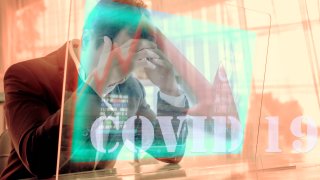
What to Know
- Many individuals may feel compelled to tap a 401(k) retirement plan or IRA early, or take out a loan
- Freelancers face complicated tax season decisions
- College students and their families are anxious about education costs already spent as schools shut down
Americans of all ages are facing financial stress from the coronavirus, which already has caused a stock market crash, lost wages and mounting layoffs. Whether you are retired or near retirement, a freelancer with complicated taxes, or a college student sent home from school, here are answers from CNBC’s Sharon Epperson to some of the critical questions to stay financially sound at a time of unprecedented challenges.
Watch Sharon Epperson answer your questions on Instagram here.
1. Is the federal government going to allow penalty-free withdrawals from 401(k)s and IRAs?
Generally, if you take a distribution from an IRA or 401(k) before age 59 1/2, you will likely owe both federal income tax (taxed at your marginal tax rate) and a 10% penalty on the amount that you withdraw, in addition to any state income tax in some cases.
We haven’t heard anything definitive yet on providing an exception to these IRS rules as part of any relief program during the coronavirus pandemic. However, provisions to provide an exception from the 10% early distribution penalty have been made for federally declared disasters in the past, according to retirement consultant Denise Appleby. Such provisions were made under the Disaster Tax Relief and Airport and Airway Extension Act of 2017 to help the recovery process for those affected by Hurricanes Harvey, Irma and Maria, as well as the Bipartisan Budget Act of 2018 for the 2017 California wildfire victims.
If you need to tap your retirement funds, another option may be to take “hardship withdrawal” from your 401(k) at your current employer, which allows funds to be withdrawn from your account to meet an “immediate and heavy financial need.” The withdrawal amount is “limited to the amount needed to meet that financial need.”
U.S. & World
However, employers don’t have to offer hardship withdrawal or even allow you to take out loans from your 401(k). Check with your benefits department to learn about your employer’s policy.
2. Should freelancers hold off making quarterly tax payments?
Take a pause, freelancers, if you’re concerned you can’t afford to make your estimated tax payment and need to hold onto that money for your cash cushion. “Hold off on quarterly tax payments,” said New York-based financial advisor Stacy Francis of Francis Financial. “You may not have an income or you have a reduced income right now.”
There are 57 million freelancers in the U.S. and, like you, many are already feeling a significant impact of this health crisis on their livelihood.
Freelancers, self-employed workers, and independent contractors who receive a 1099-MISC form are generally required to file an annual return and pay estimated tax quarterly. However, the IRS has said if your income is uneven during a given year you can vary the amounts of payments and pay in installments to ensure you aren’t penalized for underpayment. Generally, the key is to make sure you pay estimated tax that is equal to at least 90% of the tax owed for the current year to avoid any penalty.
More from Invest in You:
Financial independence fans see opportunity as market lurches
SBA and small business loans have never faced test like coronavirus
Your brain is making you stockpile. It’s also making you want to flee to cash
So, you’re not off the hook. “You have to track what income you’re making on a monthly basis so that you don’t find that you’re underpaying,” said Francis, who is also a member of the CNBC Advisor Council. Your quarterly tax payment is usually based on your income from the previous year. However, “if you see your annual income is going to be lower, then it’s pretty clear the amount you paid in taxes last year is not going to be required from you this year,” Francis said.
When you file your 2020 tax return, just make sure you balance it all out, said Judith Rosenthal, vice president and financial advisor at Bernstein Private Wealth Management. Generally, “if you owe at that time and don’t pay, you’ll pay a penalty.”
However, as Treasury Secretary Steve Mnuchin just announced some tax filing changes for the 2019 tax season on March 17, we could see some changes in next year’s tax filing season as well.
3. Should young people begin increasing 401(k) contributions?
Most financial advisors say increasing your 401(k) contributions to take advantage of low stock prices in a down market makes a lot of sense, especially for young adults who have decades to deal with ups and downs in investments before they retire.
But first take the pulse of your overall financial health. Francis says there are four factors to consider before raising your retirement plan contribution rate. “This is a person who has job security. They know their income will not be negatively impacted, and they have no credit card debt and a decent emergency fund,” she said.
If you need to shore up your emergency fund, direct any extra money you have to a high-yield savings account. “Building up your cash reserves and having cash on hand are important factors in securing your options in a time of crisis,” Rosenthal said. “Replenishing and fortifying your foundation allows you to bring a more strategic perspective to other financial decisions you make.”
“Contribute as much as you can, but have an emergency fund,” said certified financial planner Ivory Johnson of Delancey Wealth Management. “Once that market volatility lowers and the winds die down a bit, then you can go back to dollar cost averaging into your 401(k). You’ll have money built up in savings then and can jump right in.”
Also, 401(k) investors need to be prepared to stomach more turmoil in the markets in the near-term. “You’re buying into a market with incredible volatility, and it’s spreading,” said Johnson, who is also a member of the CNBC Advisor Council. “It’s like hitting a golf into gale force winds. No matter how good the shot, you don’t know where it’s going. That’s why you’re seeing such wild swings. And the range of outcomes is much broader than it normally is.”
4. Will college students be compensated for shutdowns?
Many students and their parents are upset because colleges have cancelled classes or moved them online. Some believe they should get a refund because they paid for courses to be taken in person, not online.
“Colleges cannot charge for products and services that they have not delivered,” said Mark Kantrowitz, vice president and publisher of SavingforCollege.com. “Several colleges that have told their students to vacate the on-campus dormitories have said that they will provide prorated refunds for room and board. Others have not yet said whether they will issue refunds.”
Even if offered, a refund won’t necessarily mean cash back to students and families.
“A refund of room and board, for example, will also involve an adjustment to the college’s cost of attendance,” Kantrowitz said. “Since this will result in a reduction in financial need, the refund may be a return to the lender, reducing the student’s debt.”
Also, colleges are allowed to pay federal work study wages even if the student is unable to work due to a campus closure as long as the college continues to pay its faculty and staff and to pay its share of the federal work study wages, he said.
Eligibility for loans and Pell Grants will not be reduced this academic term because of a reduction in the student’s enrollment status, Kantrowitz said. However, if the Coronavirus crisis continues into the fall, aid eligibility will be determined fresh for that term.
This story first appeared on CNBC.com. More from CNBC:



